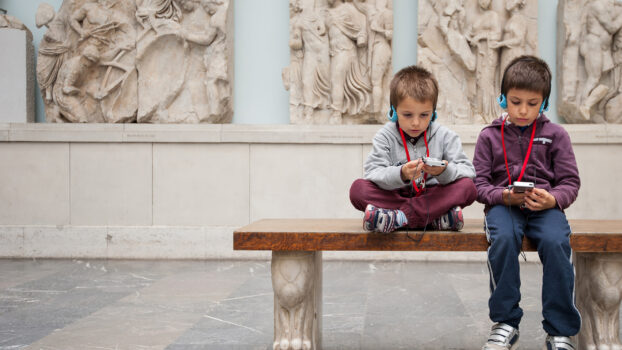Art Education
Art Education (M.A.)

The Master’s degree programm in Art Education focuses on art education at the interface between art and education. The course enables students to develop a reflective and scientifically sound attitude towards artistic work in educational contexts. Art education theories, educational practice and research aim to deepen students‘ understanding of the learning and development potential of artistic activity in cultural, art and museum education contexts.
- Degree
- Master of Arts (M.A.)
- Duration of studies in semester
- 4
- Start of degree program
- Winter semester
- Study location
- Erlangen, Nuremberg
- Number of students
- 1-50
- Subject group
- Art, Art Sciences
- Special ways to study
- Part-time degree program
- Teaching language
- completely in German
- Admission Requirements
- Qualification assessment
- Keywords
- Art, Education Science
What is the degree program about?
The course includes modules in art education and its related disciplines of education and art history. Art education modules include concepts and theories of art education, practical art content and art education research. Empirical research methods and their application to art education issues enable students to act in an evidence-based and reflective manner in art education.
An individual profile is developed in the compulsory elective area and students can set their own focus, for example in art history, art practice, psychology, media education, aesthetic-cultural education or empirical social science research. The internship also offers the opportunity to gain experience in the desired field of art education according to your own profile and to network with institutions and facilities in art/cultural and museum education during your studies.
-
The Master’s in Art Education has a scope of 120 ECTS and is made up of different module groups:
- Art Education (40 ECTS)
- Pedagogy (10 ECTS)
- Research Methods (10 ECTS)
- Compulsory elective area (20 ECTS)
- Master’s thesis (30 ECTS)
-
The Master’s in Art Education includes a compulsory elective area worth 20 ECTS credits. Here, students can expand their specific knowledge and develop their individual art education profile. To this end, modules are offered in a total of six compulsory elective areas:
Art practice
art history
Aesthetic-cultural education
media education
Psychology
Empirical-social science research methods
Further information can be found here.
-
Art education work combines artistic and pedagogical activities. Applicants should have a keen interest and initial experience in both areas.
Professionalism in art education also requires a reflective and scientifically sound approach. Applicants should therefore enjoy academic debate and have an interest in empirical educational research and practical research in the field of art and culture.
-
The Master’s degree program in Art Education at FAU combines artistic and pedagogical activities. The combination of art, education and research is unique in the Bavarian educational landscape in this orientation and the concept of broad range of electives.
The chair of Art Education and Didactics has modern studios and workshops. A wide range of artistic courses allow students to deepen their own artistic practice on the Master’s degree course.
International cooperations enable students to complete an internship abroad.
-
The Master’s in Art Education opens up different perspectives in the professional fields of art education and related areas. Art educators work in a wide range of areas that go far beyond the traditional school sector. In addition to working in private schools and educational institutions, they also work as art educators in museums, galleries and cultural institutions. Further career prospects can be found in social work, for example in child and youth welfare, in inclusive services or in work with senior citizens. There are also opportunities in publishing, foundations and cultural management. Many art educators also work freelance, lead workshops or realize their own projects. Exciting career prospects also open up in the liberal arts, design and digital education.
The research-oriented focus of the Master’s in Art Education also qualifies students for academic work in research and teaching at universities in the field of art and education.
-
Students in the Master’s program in Art Education can work on current research projects at the Chair of Art Education and Didactics as part of their Master’s thesis.
-
- Admission requirements (first semester)
- Qualification assessment
- Application deadline winter semester
-
15.07.
- Content-related admission requirements
-
Formally, the Master’s in Art Education si offered consecutively, i.e. a relevant degree related to art education should be available. Students who have a related degree, e.g. a degree in Fine Art or Illustration or a Bachelor’s degree in Art History, can also be accepted onto the Master’s program. In the case of related degrees, conditions may be imposed as part of the admission procedure.
Language skills
- German language skills for international applicants
- DSH 2 (written 2 / oral 1) or equivalent
- Details and notes
-
Please inform yourself here on the chair’s website about the qulification assessment procedure.
Do you need help or more information?
Our Student Advice and Career Service (IBZ) is the central point of contact for all questions about studying and starting a degree programme. Our Student Service Centres and subject advisors support you in planning your studies.